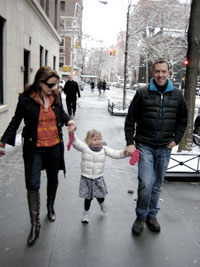Let me make sure I have my facts straight: In the heart of New York City, a husband and wife, and their very young daughter, embark on a year long journey to transition into a lifestyle that leaves behind a zero carbon footprint? That means: no plastic bottles, no restaurant food, no coffee shops, no shopping for any new clothes or new products, no cars or taxis (mostly bicycle transportation), no elevators (they live on the ninth floor), and no electricity. Wait, there’s more: No laundry detergents, no laundry machines (yes, there is a substitute), no toilet paper, no shopping at supermarkets for food; am I getting this picture correct?
Colin Beavan is the mastermind behind the No Impact Man project, an author and magazine writer by trade, not a veteran of environmental causes, and his wife, Michelle Conlin, a senior writer at BusinessWeek magazine, who is very much a city woman, who loves to shop, drink good coffee, and assiduously sidestep “Nature”.
Shot in a cinema verité style, the audience is the unannounced guest at the table, in the kitchen, in the bathroom (thankfully, only the washing of clothes), and with Colin and his family as they weave in and out of their daily lives at home, and at work, and on short vacations—all within (or mostly within) the strictures dictated by their self-imposed journey into a no impact lifestyle.
Along the way, obstacles present both challenges and humor, and a certain level of misery one would expect as a result of certain deprivations. The surprise, of course, without giving away too much of the ending, they do make it through the year, the last 6 months without using electricity in their apartment, and manage not to get arrested by child services or become stark raving mad as a result of their odyssey. They do however end up on Nightline, Good Morning America, The Colbert Report, and a slew of other rapacious media outlets (that may represent its own peculiar form of madness), and come away with a healthy dose of realism, hope, and humility that their efforts will spur others to take their own actions to help save the planet.
That may be the biggest treat of all about this film. It’s got a great emotional story, the natural tension between two individuals, each trying to pursue their own dream, and making it a shared experience. Although, the No Impact Man is Colin’s dream, Michelle experiences her own form of transformation as a result of their journey. By taking personal action, to explore what it means to live without leaving an impact on the environment, they both must take a step back from life, and re-examine with fresh eyes their connections to the physical world, and their support for each other. Not looking for cheap answers, or pseudo, feel-good analysis, one of their friends, an organic gardener with a small plot of open land in the city, unflinchingly informs Colin about what he feels about his “no impact man” project:
Mayer Vishner:
My hesitation about your work, is that it enables people to fool themselves that all they have to do is change the lightbulb or recycle all their plastic bags, as long as they feel that way, no politician will pick it up.Colin Beavan:
And I feel that it is completely true. It’s both. … If you have a political stance, then there is an tremendous integrity to living in a way that reflects that political stance.Mayer Vishner:
At the risk of being too personal, it’s not, it’s just the facts. Michelle writes for Business Week. Millions of trees are cut down on a regular basis in order to promote the fully fallacious propaganda that America corporate capitalism is good for the people, good for you and me. If it’s your contention she makes up for it—that it evens out— because she doesn’t take the elevator in your fifth avenue co-op, I have to say, you are either dishonest or delusional.
In an odd, and perhaps wholly unexpected manner, this film begins to open up almost the most treasonous of notions, to question what it is to be an American, not based upon political ideology, but at an even more fundamental level: our role as consumers in the most capitalistic society on Earth.
To gain a sense of how long a road we must yet journey to achieve a life of happiness without causing harm to the planet, consider this. If every American family today became a “No Impact Man” for one year, as Colin and Michelle have done, our economy would sink sharply into an economic depression, no government could forestall. And yet, there is a large (and growing) body of scientific evidence to support the conclusion that we must find ways to live sustainably. The environmental toll of our continued consumption driven economy, not just America, but all the first world countries, and the developing countries that are beginning to emulate western economies, threatens the natural world and human civilization.
This small film takes one small step toward envisioning a sustainable world where there is a future. A world, we would like to achieve for our children, if we could just figure out how.
No Impact Man: Available On-Demand Streaming.
Directed by Laura Gabbert; Justin Schein
Edited by William Haugse, ACE; Mathew Martin
Music by Bobby Johnston
This post was written by Fred Gerendasy, a contributor to Cooking Up a Story as a writer and occasional interviewer. His current work is featured at Fred Gerendasy Photography.

